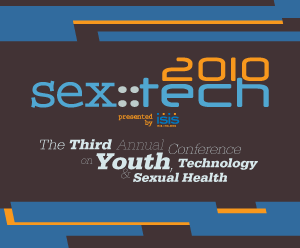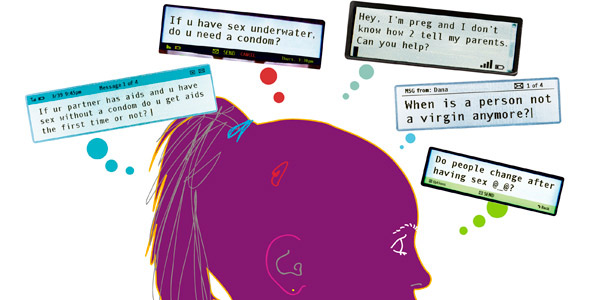 Feb. 16, 2010 Ten days from now the mother of all sexual health conferences takes place again in San Francisco with the name Sex::Tech itself conjuring controversy, intrigue, and a bit of confusion.
Feb. 16, 2010 Ten days from now the mother of all sexual health conferences takes place again in San Francisco with the name Sex::Tech itself conjuring controversy, intrigue, and a bit of confusion.
I’ve been sending people over to the Ypulse interview with Margaret Lucas from ISIS-Inc. (Internet Sexuality Information Services, the host org) for an FAQ primer…because it’s hard to capture the essence of Sex::Tech in a soundbite. ( the double-colon design element to preclude sleazy spammers has confounded many a search engine too!)
To give you an idea of how misconstrued the topic of sexual health and the names Sex::Tech and ISIS can get, here are some snippets from convos with both parents AND teens I tried to recruit to help me cover the Feb. 26 and Feb. 27 conference. Voices from our teen tribe:
“So what is it exactly, I mean, what do you DO there?” “Who attends? Is anyone my age going to be there?” and of course my freshman HS/daughter’s timeless classic, “Do I get to miss school if I cover it?”
One parent said, “Is this about sexting or those stupid videocam contests like the American Apparel ads you’re boycotting?” (um, no, but I’ll definitely be bringing up those subjects with the pros there, and sexploitation of teens will no doubt get a roundtable hoppin’!) “I thought Isis was a bird, is this some sort of sextoy thing?” etc.
In its third year now, SexTech (blog updates here) has developed a sellout following with leading edge Health2.0 speakers, youth advocate sponsors ranging from National Institute of Mental Health (NIMH) and The National Campaign to Prevent Teen and Unplanned Pregnancy to MTV and Ca. Family Health Council, but to the uninitiated, SexTech is still met with blank stares.
A teen stammered, “Um, I’m not sure my parents would let me go,” before she heard the schedule, scope and purpose of this public health convening.
I’ve written about SexTech and ISIS’ amazing work in the mobile technology arena particularly, as well as their emphatic inclusion of youth in all phases of development in their many projects...It’s an important conversation to open with teens, and one I’ve championed MANY times before. (here’s the most recent) Yet it seems from a branding standpoint, there’s still some naming quirks to overcome.
One teen said, “I went last year and learned a lot about personal health and sexuality, but if you hadn’t told me what it was, I never would have gone. It’s mostly stuff they didn’t teach in schools about STDs, prevention, safety and all that, but the name SexTech is so cold, it sounds, I dunno, like robotics or something.”
So now that you’ve heard what Sex::Tech IS and ISN’T, let’s cut to the chase and hear more from the head honcho of this sexual health symposium, Executive Director and Founder of ISIS Internet Sexuality Information Services, Deb Levine.
(Visual credit: Nicole Fineman/The New York Times)
SexTech Part One: Interview with Exec. Dir/Founder Deb Levine:
Amy Jussel, Shaping Youth: The recent study about abstinence only education having potential promise (Washington Post article here) has been called a “gamechanger” by some, including one of the SexTech sponsors, the National Campaign to Prevent Teen & Unplanned Pregnancy…What’s your take on this? Did we throw abstinence-only sexed under the bus too soon or is this skewed data by age and region or what? How has this media coverage impacted your work?
Deb Levine, ISIS/SexTech: I think it’s all about context…The abstinence only program involved over 600 6th and 7th graders in public schools in the northeast, which is absolutely beautiful if it worked to delay first intercourse or sex experiences, but to me, that’s age-appropriate, given that these kids are, what, age 10-11 max?
It’s also important to note that the WAY they taught the course was not a ‘just say no’ scare tactic, but instead a non-judgmental acknowledgment of human sexuality placed in a sexual continuum that’s developmentally appropo.
Obviously, delaying sex, having fewer partners, and abstinence altogether is excellent progress and opens up some federal funding opportunities for this age group for sure, but this program was aimed at 6th/7th graders; it does NOT mean it’s going to work for 17-year olds.
Media, as always, paints with a wide brush…
Amy Jussel, Shaping Youth: So are you saying that the abstinence only study is a moot point? I mean, most of the studies to date have proved the exact opposite, that comprehensive sexed saves lives and prevents pregancy…True? False? Apples and oranges or what?
Deb Levine, ISIS/SexTech: I’d like to see us all let go of the kind of thinking where it’s “abstinence VERSUS comprehensive sex education” and consider the larger discussion of what comprises healthy relationships and sexuality…We have to be very careful about absolutes and move the dialog away from an ‘either-or’ polarity more toward what’s developmentally appropriate for any given age.
In some ways it’s like a geometry problem where you need to know the basics of how to do a proof before you can begin to solve anything; everything builds on a core foundation. You can’t just jump in mid-way and be expected to know everything.
Sex education in schools for 5th graders is more about puberty and body changes, by 8th and 9th grade more details, STD risk factors, mechanics of sex and consequences are added; by high school the conversation extends into some of the complications of navigating healthy relationships in general, not to mention addressing dating violence, programs like The Line Campaign (where is your line, etc.) and digital boundaries, (e.g. sexting/bullying, The Thin Line etc.)
NO ONE is saying we should be handing out condoms to kindergarteners, we need to reframe the conversation so that it’s not about ‘two sides’ of a debate (abstinence vs. comprehensive sexed) but instead about creating informed consensus.
There’s no set age since kids are all different, and with each region, urban, rural demographic, etc. you’re bound to have different needs…The main goal is to provide accurate knowledge with accessibility so as kids progress from adolescence into young adulthood they can use information to be able to decide where, when, with whom and how to enter into a more intimate relationship…on healthy terms.
Amy Jussel, Shaping Youth: The internet has become a huge ‘peer educator’ for sexual health and wellness, with over 50% of youth using web resources…is it all about the anonymity or what makes the digital realm so compelling? Is mobile and mHealth the platform of choice to get the information out there?
Deb Levine, ISIS/SexTech: A lot of our work in the digital realm has used the best of technology where it makes the most sense…Like with mobile mapping to give accurate free clinic locations for HIV or texting to local referral sites from STDtest.org or SMS text advice from our sexINFO program (now sex info/life advice via text called HookUpwhere we get everything from curiosity to crisis concerns) or inSPOT to inform…
The anonymity DOES help youth access accurate resources…as we’ve proven in our 2008 study with Ypulse, YouthNoise and PeanutLabs, teens don’t always know how to source reliable health and wellness data fast…We want to fill that gap, and we’ll do so wherever we can.
Amy Jussel, Shaping Youth: How would you respond to parents who say SexTech/mobile resources usurps their parental agency? (e.g. offers a workaround outside of parental radar, etc. like this NYT article “When the Cellphone Teaches Sex Education”)
Deb Levine, ISIS/SexTech: Well, that’s definitely the area of push back..the question of “What are you telling our kids?”
Most of that is fear-based, because there’s good info and bad out there and adults have their OWN fear about the resources online, so we need to start by educating the adults for reassurance that the knowledge on these sites comes from professionals and the advice is culturally appropriate.
Parents often don’t really want to acknowledge their child’s sexuality to begin with, and kids actually DO want information from a trusted adult over peers studies have show, so the online resources give kids a safe place to turn to, and the anonymity helps them ask the tough questions they may not feel comfortable sharing.
ISIS encourages parents and youth to use technology together to learn about sexual health. For instance, parents can sit with their teens and search the Web together. It’s an opportunity for media literacy – together they can see who created the website (academic, commercial, individual, etc.) and discover how to identify the “good stuff”/accurate information. We offer many tips like this at Sex::Tech, as well as a reduced registration fee for adults who attend the conference together with a youth, and many parent-child teams take advantage of this every year.
Ultimately, we know the perceived anonymity of the computer screen, widgets, apps and social media platforms provide an opportunity for curating helpful content to reach kids where they are, to keep them safe, healthy and informed.
Stay tuned for Part Two Tomorrow with Deb Levine where we talk about media’s fixation with the sex sells ratings game, responsibility/accountability of media and marketing messages in public health and the winners of the ‘Say What?’ contest where over 13,000 youth submitted the best/worst advice received from adults! (THAT should be a hoot)
Mission:
ISIS: Internet Sexuality Information Services, Inc., established May, 2001, is a nonprofit 501(c)(3) organization developing technology for promotion of sexual health and healthy relationships, and to prevent disease transmission. Our mission is to provide leadership, innovation, educational resources and research in online sexual health promotion.
Related Posts on Shaping Youth
Kids Prime Time TV Health Cues Ingested (For Better or For Worse)
Influencers, Accountability & the Global Cost to Youth
Text Monster: Teen Tips On Digital Dating Obsessions
Sex::Tech Top 10 Teen Sex Ed/Safety Videos (By Kids, For Kids)
Interview w/Amy Jussel on The Girl Revolution (sex ed/media)
Interview w/Amy Jussel on The Girl Revolution (sex ed/media Pt2)
Related Resources for Youth
- American Sexuality / NSRC
- Advocates for Youth
- Birds and the Bees Project
- KidsHealth.org/Teen Sexual Health
- The National Campaign
- NSRC-National Sexuality Resource Center
- Object Adjective
- RH Reality Check
- Sex, Etc. (By Teens for Teens)
- Siecus (Sexuality Info Ed Council of U.S.)
- Stay Teen.org
- Teensource
- Teenwire
- I Wanna Know.org For Teens (Am. Social Health Assoc.)
- My Sistahs.org
- Scarleteen: SexEd for the Real World
More Resources
Efficacy of a Theory-Based Abstinence Only Intervention Over 24 mos
Abstinence Only Programs Might Work Study Says
Abstinence Only SexEd Statistics: Final Nail in the Coffin
Amplify Your Voice (Youth-Driven/Sexual Health Activism)
Project: Enterainment Industry Resources on Sexual Health
Managing the Media Monster (Influence of Media)
The Kinsey Institute: FAQs on Teen Sexual Activity
CDC-YRBS National Trends in Risk Behaviors
CDC: 1991-2007 Trends in the Prevalence of Sexual Behaviors
TV/Internet: Advocates for Youth Factsheet-Sexual Health Info The Media










The style in which this post has been presented is superb. The post itself ( Shaping Youth » Sex::Tech 2010; Teens & Public Health Converge (Pt. 1 of 3) ) is informative. Thanks so much.